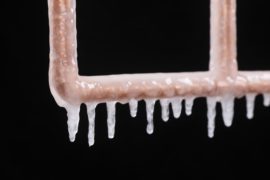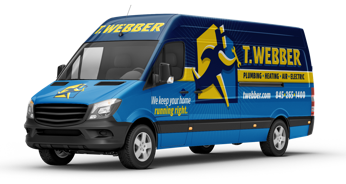
5 Tips to Keep Your Pipes From Freezing During Winter Storm Grayson
The Hudson Valley has been experiencing arctic temperatures since before Christmas – but mother nature is not done yet. As Winter Storm Grayson works its way north, forecasters are anticipating it will get worse before it gets better. Over the weekend, temperatures are expected to be 20 to 40 degrees below normal with “real feel” temperatures reaching 20-30 degrees below zero in some parts of upstate New York (Brrrrr!). These arctic temperatures, paired with damaging wind gusts of 40-50 mph, create the perfect storm for frozen pipes and property damage. The possibility of downed trees and widespread power outages … [Read More]
3 Common Things That Could Be Destroying Your Home’s Plumbing System
Modern plumbing is a remarkable system that is all too often taken for granted. Though it serves as a vital lifeline that removes waste and brings in fresh, clean water for cooking, drinking, bathing and cleaning, many homeowners don’t give it much thought – that is until a problem arises. Unfortunately, many of us unknowingly do things that cause backups and other problems with our plumbing systems. Here are three common things that could be destroying your home’s plumbing system. Things That Could Be Damaging Your Plumbing System Right Now Trash. If you use your garbage disposal or toilet … [Read More]
3 Easy Ways to Prevent Frozen Pipes
Freezing temperatures can cause serious problems inside your home. When the temperature drops, it can cause the water in your pipes to freeze, possibly resulting in a burst pipe. A burst pipe is a serious plumbing emergency that can cause major flooding and significant water damage, in addition to driving up your water bill. While, unfortunately, we can’t tell you how to prevent frigid winter weather, we can give you a few tips on how to prevent frozen pipes in your home. How to Prevent Frozen Pipes One of the most important things to note is that pipes in … [Read More]
Important Features You Should Know Before Plumbing Maintenance
Plumbing maintenance is an absolute must for your home, especially if you expect to live without the constant threat of drain clogs. However, for many first-time homeowners, the idea of maintaining a plumbing system may seem like a daunting task, especially when they are not as familiar with its various fixtures. When we say “fixtures,” we don’t even mean the essential ones everyone thinks about, like toilets and sinks. In fact, there are several smaller features to your plumbing system you need to concern yourself with. Features like water main valves and water pressure regulators may not be immediately … [Read More]
Our Local Plumber’s Holiday Guide – Preparing Your Plumbing System
A local plumber should the first person to call if you want to ensure your holiday season is one filled with cheer, or else you may find yourself shouting “Bah! Humbug!” at every small plumbing issue. As we draw nearer to the holidays, you are most likely focused on gift shopping, great food, and spending quality time with family. However, you should not allow your excitement for the holidays allow you to lose focus on your plumbing needs. Truth be told, just because we are in a time of seasonal cheer does not mean your plumbing problems will suddenly … [Read More]
6 Helpful Toilet Repair Tips
A toilet repair can save you from the one plumbing problem sending shivers up the spine of homeowners everywhere—toilet clogs. If you want to avoid cleaning up the mess and keep your toilet clog-free, you need to call for a repair service immediately. Even just waiting a little while longer can result in a plumbing catastrophe so costly you may wind up with no money in your wallet. When you allow a clog, overflow, or leak to persist in your toilet, it may lead to significant water damage on the surrounding floor that may cost thousands of dollars to … [Read More]
The Top 8 Drain Cleaning Tips
Drain cleaning is a normal part of being a responsible homeowner. In fact, it’s probably one of the most important things you can do when maintaining your home’s plumbing system. Allowing any clog to persist in your plumbing system can result in drastic consequences. You may encounter higher utility costs, poor levels of sanitation, and bad sewer odors. Worse, you will lose access to essential plumbing fixtures like toilets and showers. Considering how often you use these fixtures on a daily basis, it will be impossible to live in your home conveniently. The clogs may also hinder their efficiency … [Read More]
3 Warning Signs You Need Sewer Cleaning in Pleasantville, NY
Sewer cleaning in Pleasantville, NY is an urgent matter. However, even though it’s an essential part of maintaining your plumbing system, there are still several homeowners who won’t call for sewer cleaning service when they absolutely must. This is mainly because their sewer line isn’t immediately visible to the eye, meaning problems can persist without the homeowner even being aware. In fact, given their lack of visibility, sewer lines are often taken for granted. Homeowners know what they accomplish but won’t pay attention to it until it begins experiencing problems. However, here at T.Webber, we want you to be … [Read More]
Why Water Jetting Is the Most Effective Type of Drain Cleaning in Brewster, NY
Are you in need of drain cleaning in Brewster, NY? Then you’re best advised to hire a plumbing contractor that offers water jetting. Read on to find out why! Why You Need Drain Cleaning in Brewster, NY Before we dive into the best plumbing practices for drain cleaning, let’s just take a moment to examine exactly why you need to keep your home’s drains clean. We’ve seen it happen so many times: first-time homeowners who are truly surprised by the fact that their drains are clogged. Of course, if you’ve been renting all your life, or if you’ve just … [Read More]
3 Signs You Need New Bathroom Fixtures in Cold Spring, NY
Now that it’s summertime, perhaps you’re looking to make a change. Usually, at this time of year, that means upgrading your air conditioning in order to keep cool and escape the intense summertime heat. However, have you also considered new bathroom fixtures in Cold Spring, NY? You may have looked around at the fixtures in your bathroom lately and thought, “Wow, these really need to go” If you decide to keep your old, failing fixtures, it may turn into a summer you’d rather forget, due to constant plumbing problems every time you use the bathroom. If that doesn’t seem … [Read More]




